Unconventional #25: Will Chris Christie move to the top of Trump’s veep list after the Orlando attack? (and more!)
1. The Trump Veepwatch, Vol. 6: Chris Christie
In which Unconventional examines the presumptive Republican nominee’s possible — and not-so-possible — vice presidential picks. Previous Trump installments: Newt Gingrich, Jan Brewer, Bob Corker, Mark Cuban and Rick Scott.
Name: Christopher James “Chris” Christie
Age: 53
Résumé: Governor of New Jersey; former 2016 Republican presidential candidate; former U.S. attorney for the district of New Jersey; former Morris County, N.J., freeholder
Source of speculation: It used to be that we observed a “moment of silence” after a national tragedy. But the Internet Age has pretty much done away with that luxury.
And so, on the same day that gunman Omar Mateen perpetrated the worst mass shooting in U.S. history, killing 50 and wounding 53 after opening fire at a gay nightclub in Orlando, Fla., respected political pundits somehow found themselves ruminating on network television about how such senseless carnage would affect presumptive GOP nominee Donald Trump’s choice of running mate.
“If this turns out to have been inspired by ISIS, it will fulfill Donald Trump’s prediction of the problem with [Hillary Clinton’s] candidacy, which is, it’s not serious about terrorism,” said conservative talk-radio host Hugh Hewitt on NBC’s Meet the Press. “Egypt, Libya, Syria, her whole record is a disaster. The server is a disqualifier. So it’s going to frame this. It’s also going to frame his choice, which is imminent, of his vice president. And I think it strengthens the case for Chris Christie.”
Meanwhile, the New Yorker published a long feature Monday about the Republican Party’s ongoing struggle to reconcile itself to Trump’s candidacy. In the story, Ryan Lizza described Christie as having “transformed himself into a sort of manservant, who is constantly with Trump at events.” As proof, Lizza reported that a Trump staffer had recently used Snapchat to send a friend a “video of Christie fetching Trump’s McDonald’s order.”
Together, the two media mentions painted a clear portrait of Christie as a VP prospect well suited (if Hewitt is to be believed) to the post-Orlando moment — and willing to do whatever it takes (if Lizza is to be believed) to make sure Trump knows it.
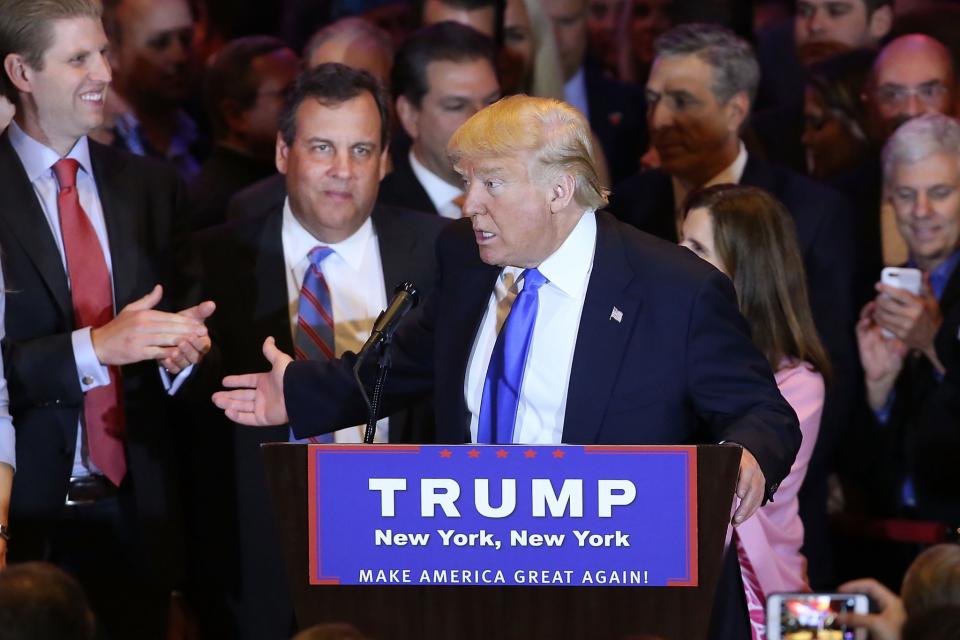
Backstory: Christie has been ready for his close-up for months now.
When the Garden State governor was competing for the Republican presidential nomination as a no-holds-barred truth teller in late 2015 and early 2016, he regularly ripped into Trump for … well, anything and everything.
At the time, Christie described the Manhattan mogul as a “thin-skinned” “13-year-old” “carnival barker” whose plan to build a wall on the Mexican border “makes no sense,” whose approach to Syria was “painfully naive,” and whose proposed ban on Muslims entering the U.S. was “ridiculous” — “the kind of thing that people say when they have no experience and don’t know what they’re talking about.”
“The guy who’s running first in the polls — you know it’s all make believe, right?” Christie said days ahead of the New Hampshire primary. “It’s just not real. It’s all for TV.”
Then Christie finished sixth in the Granite State, suspended his campaign, and pulled the most whiplash-inducing 180 of the 2016 cycle, forsaking fellow establishment types like Marco Rubio and John Kasich and endorsing Trump instead.
“I’m happy to be on the Trump team,” Christie said during a Feb. 26 press conference, “and I look forward to working with him.”
Political commentators, and even professional conservatives, struggled to make sense of Christie’s decision. “Chris is a dear friend,” said South Carolina Governor Nikki Haley. “But none of us understand why he did this.” Some even wondered whether he’d been taken hostage.
The explanation most observers eventually agreed on? “Base careerism,” as longtime Christie supporter Noah Rothman put it in Commentary magazine.
The argument goes like this: Christie’s second term as governor ends in 2018; his approval ratings in New Jersey are abysmal; it’s hard to imagine him ever winning statewide office again. The guy needs a job.
With his early endorsement, and his subsequent surrogacy, the theory is that Christie has been trying to get in on the ground floor of a possible Trump administration — a maneuver that may have a better chance of working with Trump than with a more orthodox candidate, as Business Insider’s Josh Barro observed back in February:
Most nominees have an entourage already: Senate staff, state house aides, large campaign staff, longtime political allies. When you endorse a normal candidate, you’re getting in line behind all those people for jobs. With Trump, you’re at the front of the line. Chris Christie has made himself, instantly and by a large margin, Trump’s most important ally. No endorser can do that with Rubio.
The question now is whether Trump feels like hiring him.
So far, Trump hasn’t ruled it out. “I think Chris Christie is fantastic,” Trump said in April. “So certainly he would be somebody on the list.”
And Christie is clearly open to an offer. “The fact is, that’s not been part of my discussions with Mr. Trump in the lead-up to my endorsement,” Christie said in March, “and I can only tell you that you don’t interview for those jobs.”
Odds: Improving — for two reasons.
It’s worth noting that Trump and Christie have known each other for a long time. They first met over dinner at Jean-Georges 14 years ago, when Christie was U.S. attorney for New Jersey and Trump was developing casinos in Atlantic City. Christie attended Trump’s third wedding. Trump attended Christie’s first inauguration. They like to say they’re friends — even “confidants” — though others have described their relationship as “transactional.” Either way, they’re comfortable working together.
And for Trump — who is said to value loyalty above all else — comfort could be key here. Which brings us to reason No. 1. On paper, picking Christie has some serious drawbacks. He doesn’t offer geographical diversity, or Washington experience, or swing-state electoral votes. One loudmouth from the New York metro area is probably enough for any presidential ticket.
But for the last four months, Christie has shown time and time again that he has Trump’s back, twisting himself into knots to demonstrate that his fealty to the nominee is stronger than his allegiance to the principles he professed during the primary.
Take Trump’s racially charged comments about Gonzalo Curiel, the Mexican-American judge overseeing the Trump University fraud suit. These days, a running mate’s most important role is to serve as the nominee’s top surrogate. To speak on his behalf whenever necessary. To brag about the good news. To spin the bad. To stay on message. And to defend the boss no matter what.
But of all Trump’s rumored vice-presidential prospects, only Christie bothered to defend Trump during the Curiel firestorm, telling reporters in New Jersey, “I am not going to get into critiquing a campaign that we’re in the middle of.”
“Donald Trump is not a racist,” Christie added. “The allegations that he is are absolutely contrary to any experience I’ve had with him over the last 14 years.”
At the rate Trump is going — and at the rate Republicans are denouncing him — it’s entirely possible that by the time he arrives at the convention in Cleveland, which is where he plans to announce his running mate, there will be no one left who he feels has been loyal enough to earn the job.
Other than Christie, of course.
The second reason why Christie’s stock could rise is, sadly, Orlando — or more specifically, Trump’s calculation that renewed fears about future terrorist attacks could propel him to the presidency in November. As a candidate, Christie touted his terror-fighting days as a federal prosecutor in New Jersey, claiming that his experience “sending terrorists to jail” made him uniquely qualified to protect the homeland. He even described “national security” — i.e., “keeping America safe and secure from terrorist attacks and making us a better ally and neighbor around the world” — as “the signature issue of my campaign.”
True to form, Christie made sure to talk tough about Orlando this week. “These people hate us because of who we are, and they’re going to try and kill us, and that’s what this is all about,” the New Jersey governor said Tuesday during an appearance on WFAN radio. “It’s unacceptable to allow this kind of stuff in our country and for us not to fight back, and we need to fight back, and that’s all these people understand.”
Critics have questioned Christie’s anti-terrorism credentials — on WFAN, he failed to clarify where exactly the U.S. should “fight back” after a mass shooting by an American-born lone wolf — but either way, his résumé is longer than Trump’s. If the presumptive nominee wants to keep using the Orlando massacre to criticize Clinton’s foreign-policy record — as he did Monday with his speech in New Hampshire — then choosing Christie might start to seem like an effective way to amplify his message.
Still, there’s one complication that could prevent Trump and Christie from teaming up in the fall. Trump is set to testify in the Trump University fraud suit in November; two months earlier, a pair of former Christie lieutenants are scheduled to stand trial for their role in his administration’s Bridgegate scandal. Ultimately, two major corruption cases in the middle of a general-election campaign may prove to be one too many — even for Donald Trump.
_____
2. Orlando raises questions and concerns about convention security
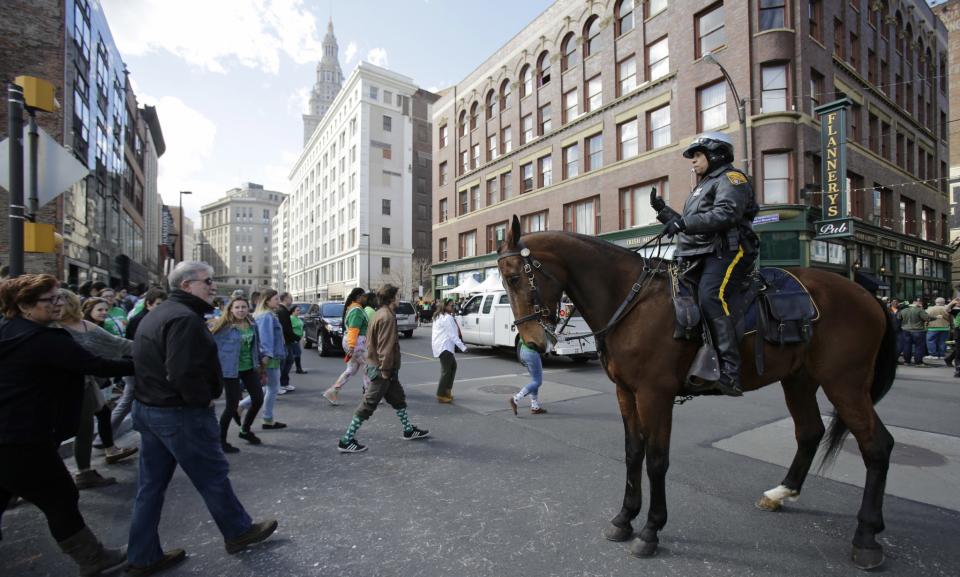
In March, the major convention-related security threat seemed to be the “riots” that Donald Trump said would engulf Cleveland if Republican elites tried to block his nomination. Two months later, after Bernie Sanders supporters revolted in Nevada, it was the Democratic convention in Philadelphia that was starting to look dangerous.
But in recent weeks, Republicans have basically reconciled themselves to Trump. Democrats recognize that Clinton, who clobbered Sanders Tuesday in the final primary of 2016, in Washington, D.C., will be representing their party in the fall.
Meanwhile, on Sunday, a single gunman shot more than 100 people in an Orlando nightclub.
Could a lone wolf strike one of the conventions? Should authorities now be more concerned about another attack than about some unruly protestors?
The reasons why a mass shooter might target a national political convention are clear. Tons of media. Prominent, powerful attendees. And a single location — usually an arena.
Less clear is whether law-enforcement officials will be increasing security measures in the wake of the Orlando massacre. Representatives with the city of Cleveland and the Cleveland FBI office responded Sunday to a local press inquiry by releasing a joint statement that said both entities will continue to work to ensure the city is safe. The statement didn’t delve into any details.
“During this time of tragedy and sadness, we must remain vigilant and prepared to protect the City of Cleveland’s citizens and visitors at all times,” said Mayor Frank Jackson. “We have formed deep bonds and partnerships with many law enforcement agencies across all levels and will utilize these partnerships in the present and future.”
According to the Cleveland Plain Dealer, “a spokesman for the Republican National Convention deferred to the U.S. Secret Services when asked questions about security,” and the paper’s calls to the Secret Service went unreturned.
So far, we know that the security perimeter for the GOP convention will encompass two zones: an event zone in downtown Cleveland (and beyond) and a more restrictive, cordoned-off zone around the Quicken Loans Arena itself. To get into the latter, attendees will have to display identification; they’ll also be prohibited from carrying firearms. Outside the arena, however, guns will be OK — even though water guns, metal-tipped umbrellas, fireworks, and lumber will be banned. From a 24-hour-a-day emergency operations center — complete with a “video wall” capable of displaying up to 20 sources of information at once — officials will monitor more than 100 surveillance cameras spread throughout downtown Cleveland.
That said, “no additional measures, such as the use of metal detectors or the need to show identification, [have] been announced for the less-restrictive event zone,” according to the Plain Dealer.
The story in Philadelphia is similar. More than 20 subcommittees are examining infrastructure, transportation, security and crowd management, among other things; dozens of government agencies are involved. The Wells Fargo Center and Xfinity Live! arenas will be surrounded by “no-scale” fencing at least five feet high. Some police departments have declined to send officers to Cleveland, citing concerns about leadership and preparedness, but Philly knows the drill at this point; the DNC will be city’s second National Special Security Event in the last year, after Pope Francis’s visit in September.
“This is not the papal visit,” Secret Service agent James Henry recently told Philadelphia’s NBC affiliate. “This is much smaller in scope and much smaller in scale. So the security footprint is going to be much smaller.”
Experts consider national political conventions to be safer than large concerts or sports games — events that don’t trigger nearly as much security planning or benefit from having nearly as many law-enforcement officers on site.
But with fears of domestic terrorism on the rise after Orlando, authorities may adjust their convention plans in the weeks and months ahead. Unconventional will continue to monitor their efforts.
_____
3. Sanders wants to fundamentally transform the Democratic Party in Philadelphia. Will Clinton let him?
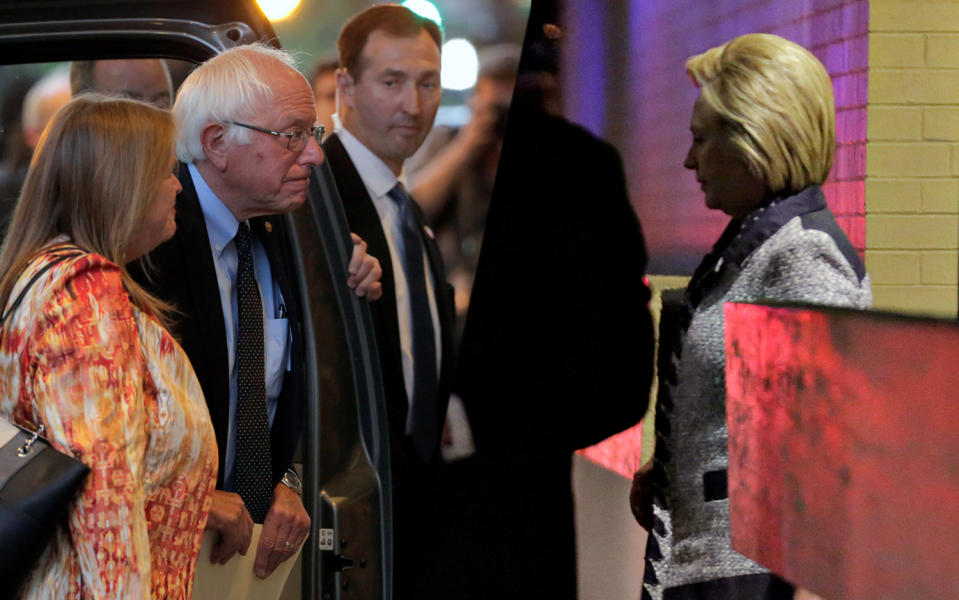
By Liz Goodwin
Hillary Clinton and her top advisers met with Sen. Bernie Sanders and his wife, Jane Sanders, Tuesday evening, shortly after Clinton was projected the landslide winner of the final Democratic primary in Washington, D.C.
The meeting, at a D.C. hotel, lasted nearly two hours and marked the first time the candidates have met face to face in months. Neither candidate spoke to the press after their summit ended, but the pair had agreed to discuss the end of the Democratic race and Sanders’ desire to change the Democratic Party.
(Read the full version of this story.)
The Clinton and Sanders campaigns released nearly identical, carefully worded statements after the meeting, saying the candidates had congratulated each other on their campaigns and had a “positive” discussion. They agreed to work to develop a “progressive agenda” for the party platform in July and to unite the party to defeat Donald Trump.
Sanders has at times vowed to “fight” all the way to the Democratic convention in July, but Clinton has said she expects that they will go into the convention united.
Sanders faces mounting pressure to step down and throw his support behind her.
There are signs Sanders is starting down that road. Sanders’ campaign announced to supporters Tuesday that he will make an important video announcement Thursday night from his hometown of Burlington, Vt. The senator has also stopped saying he wants to convince superdelegates to flip from supporting Clinton to him. And Sanders declined to hold a rally Tuesday night, as he has on other election nights.
But the candidate is not going down without a fight. In a feisty news conference earlier Tuesday, Sanders reiterated that he wants to fundamentally transform the Democratic Party and called for a replacement of the Democratic National Committee’s “leadership,” presumably meaning chairwoman Debbie Wasserman Schultz. (He has already endorsed the congresswoman’s primary opponent in Florida.)
“I do believe that we have to replace the current Democratic National Committee leadership,” Sanders said. He also called for “the most progressive platform” ever at the convention in July.
Sanders has vowed to take his progressive ideals to the convention, but it’s unclear how many of his goals — which include changing the Democratic nomination process by eliminating superdelegates and allowing independents to vote in Democratic primaries in every state — he can achieve.
“He has every right to express his opinion — he got a lot of votes!” said former Pennsylvania Gov. Ed Rendell, a Clinton supporter and a former chair of the DNC. “That doesn’t mean he has to get his way there.”
_____
4. How the Republican convention could sink Trump
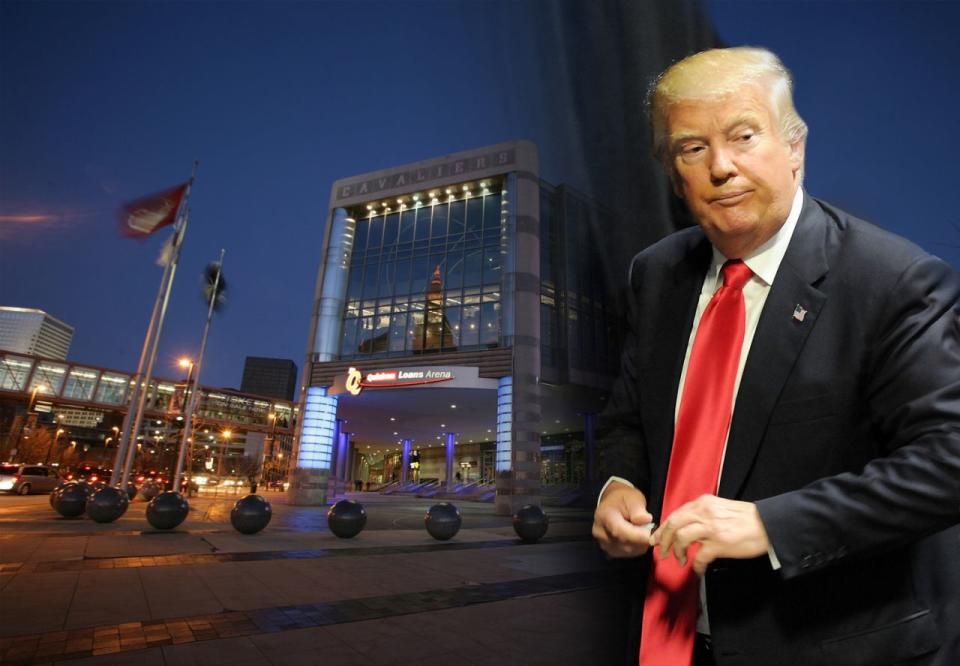
By Matthew Dallek
The press likes to write about campaigns as a series of turning points that determine the final outcome on Election Day. Yet, in reality, campaign gaffes, awkward interviews and sundry other gotcha moments that flare from time to time don’t in the main have much impact on the final vote. This July’s GOP convention in Cleveland may be the exception to that pattern, however.
(Read the full version of this story.)
The rhetoric from the Quicken Loans Arena stage is going to be minutely picked over and carry more impact politically than is typically the case; in recent decades, conventions have mostly been tightly scripted affairs in which every word uttered by a speaker is vetted, edited and approved by the campaign’s loyalists. There hasn’t been much drama. But Trump is entering an event that will be strewn with more than the typical share of political landmines. There are opportunities for the bombastic Manhattan mogul, to be sure, but also numerous perils in his path.
Trump has criticized past GOP conventions as “boring” and has vowed to put his own must-watch stamp on this summer’s proceedings. Can he pull off such a show, and will the over-the-top theatrics advance or undercut his public standing? More importantly, Trump will be searching for a way to demonstrate that the party that he now leads is actually united behind him and following him into battle. His acceptance speech (Will he dwell on “building the wall” and his proposed Muslim ban, or will he deliver anodyne, poll-tested sound bites desired by Republican leaders not named Trump?) will draw more than the usual share of coverage for the nominee.
Then there will be those conspicuous absences at Quicken Loans Arena. Both former President Bushes and Mitt Romney have already declined to attend Trump’s gala, and Sen. Marco Rubio recently vowed to refuse to endorse Trump from the stage. These, too, are storylines that Trump’s campaign should be concerned about. Will Trump manage to persuade vulnerable Republican senators to grace the stage, such as Ohio’s Rob Portman so that he can bask in the acclaim of a convention held in his home state?
Ryan, as convention chair, will be expected to deliver a strong endorsement. But how is he going to be able to do so credibly after having essentially denounced Trump’s rhetoric as racist? As the “I’m with racist” New York Daily News cover (subsequently pulled and replaced by one with Hillary Clinton) underscored, getting out from under the impression that the highest-ranking elected Republican is championing Trump after calling his comments racist isn’t going to be so easy.
Of course, contentious conventions are not necessarily the death knell for presidential campaigns. In 1952, Dwight Eisenhower won the nomination after a contested convention, and he went on to defeat Adlai Stevenson in November. Yet the divisions on display during Barry Goldwater’s 1964 nominating convention, Gerald Ford’s 1976 convention and George H.W. Bush’s 1992 convention call to mind how swiftly conventions can unravel before the eyes of millions of viewers.
During the 1964 brawl at San Francisco’s Cow Palace — one historian called it the “ugliest of Republican conventions since 1912” — moderate Republican Gov. Nelson Rockefeller urged the delegates to put a plank in the party platform that decried extremism and was greeted with a chorus of toy trumpets, horns, cowbells and lusty boos from the pro-Goldwater delegates. In 1976, Ronald Reagan, having lost his surprisingly strong challenge to incumbent Ford in a bitterly divisive nominating contest, was called up to the stage by Ford and delivered an eloquent defense of the idea of freedom that was also noticeably lacking in a robust endorsement of the president himself.
In 1992, columnist Pat Buchanan, who had mounted his own bruising primary challenge to incumbent President George H.W. Bush from the right, endorsed Bush. But, in doing so from the convention stage, he also declared a “cultural war … for the soul of America,” ridiculing same-sex marriage and a proposal to assign women to combat Army roles, while endorsing prayer in public schools and depicting “Clinton & Clinton” as un-American. (His speech also cut into and upstaged Reagan’s primetime speaking slot.)
Those convention moments offer living, cautionary reminders that Trump’s campaign heads into Cleveland in a few short weeks with what may be a last-ditch chance to limit some of the internecine warfare roiling his party. Those past convention moments — departures from the candidates’ preferred official script — did more to harm their nominees’ fall chances than actually advance their party’s general-election prospects. In all three examples, Republicans lost the White House.
Matthew Dallek, an assistant professor at George Washington University’s Graduate School of Political Management, is the author of “Defenseless Under the Night: The Roosevelt Years and the Origins of Homeland Security.”
_____

5. The best of the rest
I talked to #AlwaysTrump, #MaybeTrump, and #NeverTrump GOP Senators and House members and wrote this: https://t.co/3sUdwFRmEa
— Ryan Lizza (@RyanLizza) June 13, 2016
i think i know what paul ryan thinks he’s doing, and it’s a terrible idea https://t.co/phkzv7nfHu
— Derek Thompson (@DKThomp) June 14, 2016
ACLU says Cleveland is out to limit free speech with its 3-square-mile 'event zone' during Republican convention https://t.co/c84dAhCs94
— NYT National News (@NYTNational) June 15, 2016
Social conservatives band together to push GOP platform more to the right, anticipating a debate in Cleveland https://t.co/sdSQBevmya
— Jeremy W. Peters (@jwpetersNYT) June 14, 2016
The question of Warren for VP is genuinely tough, as @awprokop captures well. https://t.co/kRkhXGScmv
— David Roberts (@drvox) June 13, 2016
John Kingston is refusing to give up his hunt for a third party candidate, moving ahead with ballot access project https://t.co/iFwXAo364M
— Maggie Haberman (@maggieNYT) June 14, 2016
_____
History lesson
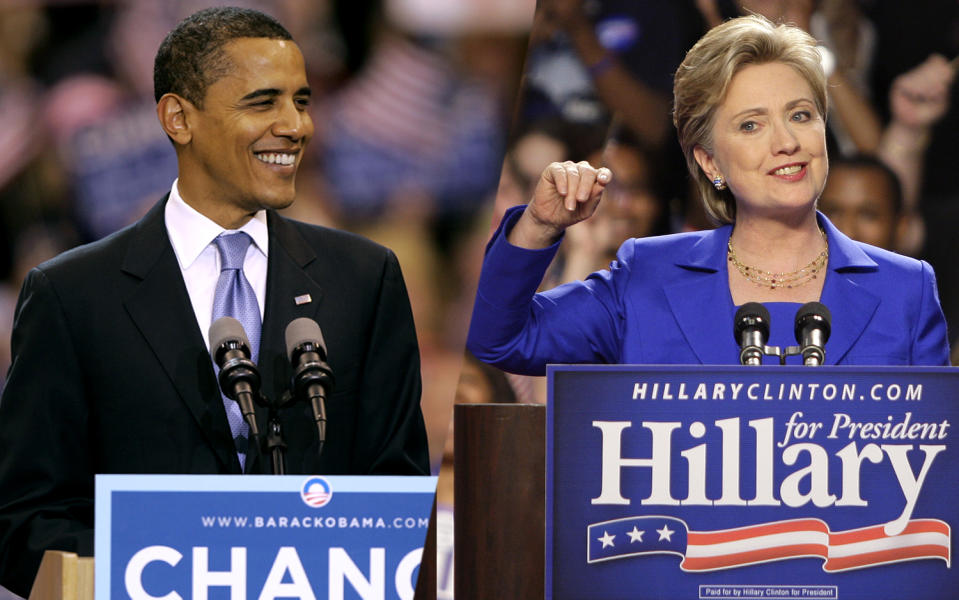
The final primaries of the hard-fought 2008 Democratic primary contest between Barack Obama and Hillary Clinton were held on June 3 in Montana and South Dakota. When the dust had settled, Obama had (with the help of a last-minute rush of superdelegates) amassed the 2,118 delegates needed to win his party’s nomination at the convention that August in Denver.
The situation is similar this year. On June 6 — one day before the last big round of Democratic primaries in California, New Jersey and elsewhere, and a little more than a week before the final primary in Washington, D.C. — the Associated Press reported that Clinton (also with the help of superdelegates) had hit this year’s magic number (2,383).
In 2008, Clinton refused to drop out on the last day of the primaries. All she would say was that she would be “making no decisions tonight.” But two days later, on June 5, she posted a message on her website announcing that would be endorsing Obama that weekend. And that’s exactly what she did.
“The way to continue our fight now, to accomplish the goals for which we stand, is to take our energy, our passion, our strength, and do all we can to help elect Barack Obama the next president of the United States,” Clinton said that day in Washington, D.C. “Today, as I suspend my campaign, I congratulate him on the victory he has won and the extraordinary race he has run. I endorse him and throw my full support behind him.”
Many media types have already accused Sanders of refusing to pull a Clinton and step aside gracefully. But consider this. The last Democratic primary was Tuesday. Sanders didn’t end his campaign. He did, however, announce that he would be speaking “directly to grassroots supporters in a live, online video message on Thursday” — precisely two days later.
If, on Thursday, Sanders does what everyone expects him to do and drops out, he will have followed Clinton’s 2008 timeline to a T. So much for all the handwringing.
_____
Countdown
For the latest data, make sure to check the Yahoo News delegate scorecard and primary calendar.


